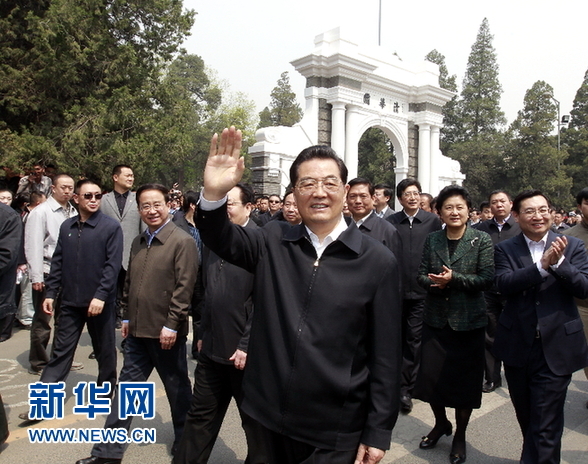Hu visits Tsinghua University on eve of centennial anniversary
Chinese President Hu Jintao visited the country's top-rated Tsinghua University Wednesday, on the eve of its centennial anniversary. He urged the university to further improve its teaching quality and scientific research capabilities.
Hu extended congratulations and greetings to Tsinghua's students, faculty and alumni at home and abroad.
Hu visited the university's history exhibition hall and called on Tsinghua to speed up scientific and technological innovation to make greater contributions to the country and its people.
When meeting with a group of renowned professors, including Nobel Laureate Yang Chenning, Hu spoke highly of their contributions to the country and expressed hope that they could help cultivate young scholars to boost China's scientific and educational development.
While talking to a group of new graduates in Tsinghua who volunteered to work in remote areas or on the front lines of national defense building, Hu said that talented students should not only learn from books but also mold themselves through social practice.
"I hope that you young people will become tempered and improve your capability at a grass-roots level and realize your own value through the course of serving the country and its people," he said.
Hu also inspected the university's Network Research Center, which is responsible for developing the next generation of Internet for China, and a center for structural biology.
He urged the faculty to work harder and speed up independent innovation while absorbing the advanced experience of other countries.
During the inspection, Hu urged Tsinghua to strive to build itself into one of the world's leading universities by further improving its research capability and teaching quality.
He also asked the university to foster more talent and contribute more intellectual support to the country's development.
The President joined his old classmates in the Department of Hydraulic Engineering, where he had once studied and worked for nine years, more than 40 years ago.
He encouraged the students in the department to cherish the time to cultivate themselves into a vital contingent in the country's efforts to develop irrigation works and a water conservation system, which are of great importance for national development.
 0
0 







